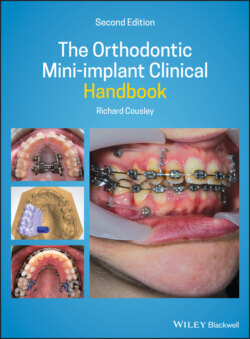Читать книгу The Orthodontic Mini-implant Clinical Handbook - Richard Cousley - Страница 13
1.3 3D Anchorage Indications
ОглавлениеThis gradual refinement of mini‐implant techniques has been accompanied by a substantial increase in the range of clinical applications for mini‐implants. The proportion of these uses will vary between orthodontists, depending on their individual caseloads, and even on financial and cultural influences. Overall, it's best to subdivide modern anchorage control according to each of the three dimensions and ‘other’ applications, with common examples for each category listed below.
| Anchorage dimension | |
| Anteroposterior | Incisor retraction and torqueMolar distalisationMolar advancement |
| Vertical | Single/multiple teeth intrusionTooth extrusion |
| Transverse | Centreline correctionsAltering occlusal planeRapid maxillary expansion (RME) |
| Other | Intermaxillary fixation (IMF) and tractionTemporary dental restorative abutment |
Table 1.1 The clinical evolution of orthodontic mini‐implant anchorage is subdivided into three chronological stages, with a description of the main focus at each stage along with representative clinical examples and associated side‐effects
| Stage of evolution | Clinical focus | Technique examples | Side‐effects |
| 1 | Reliable anchorage | Direct anchorage, from alveolar sites Indirect anchorage, especially palatal sites | Vertical effects of oblique traction, e.g. lateral openbites and uncontrolled incisor movements Hidden anchorage loss due to failings of connecting anchorage components |
| 2 | Minimised side‐effects | Traction powerarms Rigid transpalatal auxiliaries | Prevention of incisor extrusion/retroclination Prevention of molar buccal/palatal tipping movements during intrusion |
| 3 | Optimised target tooth movements (in addition to anchorage control) | Controlled 3D tooth movements during:incisor retractionmolar distalisationmolar intrusion | Bodily movement of target teeth, e.g.torque control during incisor retraction, bodily distalisation of molars, vertical molar intrusion movements |
